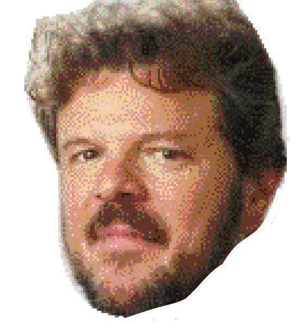
(On the set of WTFN’s new public affairs show Mind over Media, host Romana Clay is seated at a kidney-shaped table around which are large mock-ups of various newspapers and web pages. Over her right shoulder is a wall-mounted TV monitor. The theme music starts up over the opening titles and the director points to Clay, who looks directly into the camera.)
 |
PROFESSOR JOSEPH HOWE: “Thank you.”
CLAY: “Professor Howe, let’s get right to the point: is the Internet dooming print journalism to technological extinction?”
 |
CLAY: “But newspapers are dying; even the New York Times admits that print’s days are numbered. Doesn’t the Pew poll show the newspaper going the way of the buggywhip?”
HOWE: “Not really. Yes, the newspaper has lost audience and revenue to the Internet, and it will never be as important or as influential as it was in the pre-computer age. On the other hand, newspapers have on-line editions, as well as on-line advertisers and subscribers, so it isn’t a total loss. Having said that, newspapers—in fact, all media—have to adapt to a world where they can no longer dictate truth and shape reality. But instead of adapt they fight.”
CLAY: “But newspapers have an Internet presence. Is this not a sign of adaptation?”
HOWE: “A minor one, largely forced on them by circumstance, but not a true adaptation. You see, the Internet is probably the greatest force for truth and democracy since the invention of movable type in the 16th century, and this terrifies the traditional media, especially newspapers.
CLAY: “But why should they be terrified?”
HOWE: “Because they don’t serve the public good; they serve the corporations that own them, and through them the political interests and lobby groups that these corporations support. You will not find newspapers turning to the Internet to write balanced, rational reporting, for example, on the Middle East, the environment, labour issues, or national security because serving the public interest is bad for business. The tragedy of our time is that as the Internet helps people become better informed, newspapers become ever more shallow and manipulative as they prop up the official fictions that sustain their corporate owners.”
CLAY: “You said that newspapers are shallow and manipulative, but hasn’t that always been true to some degree?”
HOWE: “Yes, but the Internet has shown us just how shallow and how manipulative they are. Before the worldwideweb, we had no external reference point. Sure, there have always been counterculture or dissident publications, but none that could challenge the authority of the newspaper or reach a mass audience in real time.”
CLAY: “You’re not saying that the Internet is perfectly honest, are you?”
HOWE: “No, of course not. There’s a lot of garbage out there, but among the garbage is the balance and contrarian views that are conspicuously absent in newspapers. Without the Internet, the world would not have been able to expose the official fictions surrounding, for example, the Sept. 11 attack, Operation ‘Cast Lead’, or the attack on the Mavi Marmara. The Internet is a threat to corporate power, and therefore newspapers, as corporate properties, cannot accept the need to adapt. Mendacity, not technology, lies behind the fall of newspapers. It all comes down to opportunity cost.”
CLAY: “What do you mean by ‘opportunity cost’?’”
HOWE: “The cost of honesty versus obedience. Let’s say a newspaper runs a properly researched story or opinion piece on a matter of great public importance. If it runs up against corporate political interests, the writer could lose his job.
“That’s what happened in March to Ottawa Sun columnist Michael Harris, who had his column taken away after he had the temerity and good sense to condemn Stephen Harper for being in contempt of Parliament. Publisher Rick Gibbons denied any cause and effect, of course, saying that Harris’s column was cancelled to make way for ‘new voices’, but that’s just the standard Newsspeak to justify corporate censorship. The same thing happened to Globe and Mail columnist Rick Salutin five months earlier. The good news is that he was picked up a by the Toronto Star.
“On the other hand, if a paper runs mindless pap, it risks losing readership. One of the most bizarre cases of this occurred last October when The Vancouver Sun ran a fawning eight-part series on Justin Bieber just because he was in town for a concert. Even the managing editor couldn’t hide his embarrassment.”
 |
The Internet is a threat to corporate power, and therefore newspapers, as corporate properties, cannot accept the need to adapt. Mendacity, not technology, lies behind the fall of newspapers.” Professor Joseph Howe |
HOWE: “Newspapers still do a decent job of reporting local news—crime, fire, city council, that sort of thing —and there will always be a readership for it. Beyond that, not much. To avoid angering their corporate owners, one tactic is to lard the paper with mountains of non-news—advertorials, soft features, sports and infotainment—so that readers won’t notice the absence of real news. The newspaper, and media in general, is really little more than a Weapon of Mass Distraction, and the exodus from print to web reflects the growing belief that a news diet should feed the mind, not starve it.”
CLAY: “Can you give us an example?”
HOWE: “One egregious example took place in Vancouver during the Stanley Cup Playoffs. The editors of the Picayune-Mirror repeatedly tanked the front page in favour of redundant, trite cheerleading pics of the Vancouver Canucks, who made it all to the way to the finals. If you look at the monitor you’ll see a series of front pages of the Picayune-Mirror. Yes, the playoffs was an important local event, but that does not excuse throwing away the front page, especially when the paper’s back page is the also the sports ‘front page’. Given the already bloated sports section and the reporting overkill in the news section, there was no justifiable reason to bastardize the paper. On most days it looked like a Canucks sandwich—all bread and very little meat.”
CLAY: “Why did the editors do it?”
HOWE: “I asked that exact question, and was simply told that the publisher gave the order to give the Canucks the same saturation coverage as the 2010 Olympics—sports reduced to news filler. Why this was necessary, I never found out, but you can tell from the headlines that accompanied these pics that news judgment played no part: ‘Rock this Town!’; ‘Drop the Puck!’; ‘Make Your Plans’. What made the editors think they were being paid to be cliché-addled hustlers?”
CLAY: “At this point, news-hungry readers had to be asking themselves: ‘What news is not reported?’ ‘What do I need to know that I’m not being told?’”
HOWE: “Exactly! Clearly the Picayune-Mirror doesn’t respect its readers, so it forces them to go elsewhere for news, and the Internet is the most likely place.
CLAY: “Has the Picayune-Mirror or any other paper actually lost readership?”
HOWE: “I can’t say for certain because the newspaper climate in most cities is nearly monopolistic. Apart from the throw-away transit rags, the Picayune-Mirror is one of two dailies in Vancouver, but since both are owned by the same company, circulation figures and reader attitudes cannot be taken at face value. However, we can reasonably conclude that newspapers are doomed, but not just for technological reasons.”
CLAY: “Thank you Professor Howe. (to camera) When we return, Picayune-Mirror editor Bruce James will join us via satellite.” (two-minute commercial break) We’re back, and joining us from Vancouver as promised is Bruce James editor of the Picayune-Mirror. (to the TV monitor) Mr. James, you’ve been following Professor Howe’s comments, how do you respond to his comments about the state of newspapers and yours in particular?”
 |
CLAY: “But doesn't Professor Howe have a point when he criticizes you and the other editors for filling the front page with redundant sports pics that have no news value?”
JAMES: “Who says they have no news value? Sports is news, and the Canucks were the biggest news story at the time.”
HOWE: “No, Mr. James, they weren’t. A hockey series, no matter how important, is not ‘news’. That's why there are separate news and sports sections. Besides, you had the whole back section to promote the Canucks; you didn’t need to tank the front.”
JAMES: “I resent your use of the term ‘tank!’”
CLAY (cutting in): “Mr. James, I think Professor Howe’s point is that the back page, which also had a full-sized hockey pic and a thick hockey section, seemed adequate to the task, and that giving away the front page seemed like overkill.”
JAMES: “Our readers are interested in the Canucks, and we give them what they want.”
HOWE: “Even if that means under-reporting real news? Last I checked, the Picayune-Mirror was a newspaper, not a sportspaper.”
JAMES: “I don’t need you to tell me how to do my job!”
CLAY (cutting in): “Uh, gentlemen…”
HOWE: “Well, then, perhaps you’d tell us the news value of running a Canucks calendar or pictures of fans on the front page.”
JAMES: “I don’t have to account to you!”
HOWE: “All I want is a straight answer to a simple question, but you seem incapable of giving one. You think you can exempt yourself from having to do honest journalism by using the excuse that the Picayune-Mirror is just ‘a tabloid’.”
JAMES: “How you could equate the measure of me as a journalist based on whether or not I address the musings of someone so insignificant as yourself?”
CLAY (cutting in): “Mr. James, that’s quite enough!”
JAMES: “Then I suggest you tell your guest to show me some respect!”
HOWE (to James): “You mean the same kind of respect you show your readers?!”
CLAY (cutting in): “All right, that’ll do. Let’s take break and see if we can all calm down.” (The camera pulls back and cuts to a commercial, and then the argument continues off-camera.)
JAMES (to Howe): “I’m getting a little tired of this line of questioning. "
HOWE (to James): “And I’m getting tired of your refusal to answer questions.”
JAMES: “I am not interested in offering you my comments!”
HOWE: “Oh, that’s great! And you call yourself an editor?!”
JAMES: “Now you…”
CLAY: “…Gentlemen! We’re on in 30 seconds and I would like to move the show to another topic. So let’s put our anger away, shall we?” (short pause.) Okayyyy, we’re back and, I’d like to change focus a bit by going back to something you said earlier, Professor Howe. You said newspapers are forcing readers to go to the Internet by underreporting real news. Can you elaborate?”
HOWE: “I hardly know where to begin. Well, take international news, which is just as important to local readers as local news is. In 2008-2009 Israel launched a genocidal attack on the Gaza Strip called Operation ‘Cast Lead’. It was a wholesale massacre of civilians based on trumped up charges that the Hamas government had launched rocket attacks. In fact, the attack was six months in the planning. It rightly disgusted the world, yet there was virtually no mention of the illegality of the attack or of Israel’s use of use of depleted uranium and white phosphorus, which are expressly forbidden by law. I asked Bruce James at the time if he would write an editorial denouncing the use of these banned weapons and he said he would if I produced proof. I did, but he reneged.”
JAMES (cutting in): “I never said anything even close to writing an editorial condemning Israeli action! Given we had not to date written an editorial supporting their action, something I supported, why would I commit to writing an editorial condemning their action. I was well aware Israel admitted to using them in Lebanon. I personally do not support the use of these weapons, but I also don’t support Hamas missiles attempting to destroy another country’s vital desalination plant.
JAMES: “You lose all credibility with me when you play the genocide card, and your vitriol and hate have rendered reasonable discussion impossible! Go fuck yourself. You, sir, are a frothing, horrid little man.” (James takes off his clip-on mike and storms off the show. Clay and Howe look at each other in disbelief.)
CLAY (visibly discomfited): “That…did not go nearly as well as I had hoped.”
HOWE: “No, indeed, but at least he showed our viewers why the newspaper is dying.”
CLAY: “We’re out of time, which is probably just as well. (to the camera) On our next show, Professor Howe and I will look at how the media frames and decontextualizes the news.”
(Camera pulls back. Credits roll. Fade out.)